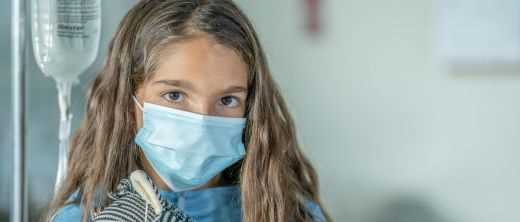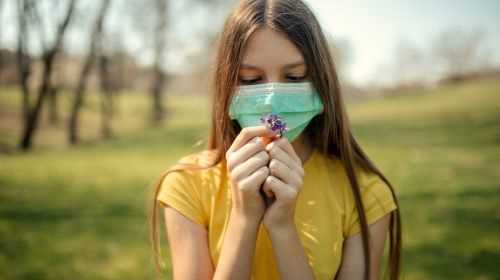Pediatric Inflammatory Multiorgan Syndrome (PIMS) is a sequela of SARS-CoV-2 infection in minors. What is PIMS exactly? What are the symptoms of childhood disease? And how is the syndrome treated?
At a glance:
What is PIMS?
PIMS is the abbreviation for Pediatric Inflammatory Multiorgan Syndrome (also known as Multiinflammatory Syndrome in Children, MIS-C for short). This is a severe, suddenly occurring inflammatory syndrome in children and adolescents, which can occur, for example, as a delayed overreaction of the immune system to an infection with Covid-19, which in many cases is symptom-free. PIMS has been receiving increasing attention since the beginning of 2020.
PIMS is very similar to Kawasaki syndrome, which is why it was also known as Kawasaki-like syndrome at the beginning of the corona pandemic. In some cases, however, the symptoms differ significantly. While Kawasaki syndrome primarily affects young children, PIMS occurs more frequently in school children between the ages of seven and 15 – more often in boys (64 percent) than in girls. Both diseases can be fatal; more than half of all those affected require intensive medical treatment.
The German Society for Pediatric Infectious Diseases (DGPI) counted 418 cases of illness in children and adolescents across Germany between May 27, 2020 (start of collection) and September 12, 2021. According to the official registration figures, it occurs after about every 1,000. SARS-CoV-2 infection in minors PIMS on (as of 09/19/2021).
Causes: How can the syndrome come about?
Antibodies against SARS-CoV-2 were found in the blood of the majority of children and adolescents who have been sick since 2020, which suggests a corona infection. However, many of those affected did not experience any typical COVID-19 signs such as fever, sore throat or cough (asymptomatic course). According to studies, the number of PIMS illnesses increases significantly about four weeks after a wave of COVID-19 cases in a region; the causal connection of the pediatric inflammatory multi-organ syndrome with the coronavirus is considered to be certain based on the current data. It is still unclear why some children develop the disease after infection, but the majority do not. Pre-existing illnesses do not seem to play a decisive role (as of 09/2021).
In general, inflammation is a common response to infection. With PIMS, however, the immune system switches to overdrive and begins to attack the body (hyperinflammatory state). This is attributed to an uncontrolled release of cytokines (cytokine storm): Cytokines are regulatory protein molecules that serve to transmit signals between cells.
What symptoms do children with PIMS suffer from?
The data available on PIMS indicate that the disease usually occurs two to six weeks after infection with Covid-19. It is usually accompanied by symptoms such as a high fever, rash, red, sore eyes, diarrhea, and / or vomiting, which can get worse over the next few days. The inflammation can spread to different organ systems. Mainly affected are:
- Gastrointestinal tract (in around 80 percent of all cases registered in Germany, as of September 19, 2021)
- Cardiovascular system (76 percent)
- Skin (68 percent)
- Mucous membrane (64 percent)
- lower respiratory tract (52 percent)
- Blood / hematopoietic organs (40 percent)
- upper respiratory tract (29 percent)
- Nervous system and neuromuscular structures (24 percent)
- Liver (23 percent)
- Kidneys (21 percent)
- Skeletal muscles (12 percent)
The World Health Organization WHO speaks of PIMS when children and adolescents up to 19 years of age show the following symptoms:
- persistent fever (longer than 48 hours)
- increased levels of inflammation in the blood without any other clear explanation
- as well as at least two of the following symptoms:
- acute digestive tract problems (for example, vomiting, diarrhea, abdominal pain)
- Rashes of unknown cause
- Inflammation of the skin / mucous membrane
- non-purulent conjunctivitis (conjunctivitis) in both eyes
- low blood pressure (arterial hypotension)
- State of shock
- myocardial dysfunction (impaired heart function)
- Pericarditis
- Heart valve inflammation
- coronary artery disease (CHD, reduced blood flow to the coronary arteries)
- Bleeding disorder
Some people suffer from neurological impairments, some of which are accompanied by hallucinations. Multiple organ failure occurs in isolated cases.
In general, PIMS can occur in different degrees.
With symptoms like
- discolored / blotchy skin
- extreme paleness or bluing of the skin and lips
- Breathing problems
- persistent chest pain / pressure
- Confusion and / or
- the inability to wake up / stay awake,
Immediate emergency medical care is required (emergency call, telephone 112), as there is an acute danger to life.
How is PIMS diagnosed?
If pediatric inflammatory multi-organ syndrome is suspected, other diseases with similar symptoms, e.g. severe heart disease, meningitis (meningitis) or blood poisoning (sepsis) must first be ruled out. For this and for further clarification of the symptoms, various examinations and tests (including blood pressure measurement, blood gas analysis, laboratory, chest x-ray and / or heart ultrasound) are carried out in the hospital. A corona antibody test is carried out to detect a previous SARS-CoV-2 infection. If the results of the examinations correspond to the disease criteria defined by the WHO, the PIMS diagnosis is made.
Treatment: what helps against PIMS?
Once recognized, the syndrome is considered well treatable. In order to protect the heart, liver, kidneys and other affected organs from permanent damage, anti-inflammatory drugs such as cortisone are usually used. Intravenous therapy with antibodies (immunoglobulins) is also possible; sometimes immunosuppressants are given. Depending on the complaints and symptomatic focus, further medications / therapies are used; antibiotics are often given in addition. In most cases, the treatment takes place under intensive medical supervision.
How is this childhood illness going?
After the first signs of PIMS appear, the health of the children and adolescents affected often worsens dramatically, which usually results in rapid hospitalization. Even if some of the possible symptoms are potentially fatal, no deaths from PIM syndrome have been reported in Germany to date. A meta-analysis published at the end of 2020, for which 16 international studies on PIMS with a total of 655 cases of illness were evaluated, calculated a mortality rate of 1.4 percent for Europe.
A British study published in The Lancet Child & Adolescent Health in July 2021, which observed 46 children seriously ill with PIMS over a period of six months after discharge from hospital, concluded that the prognosis for those affected was lower anti-inflammatory therapy is good: With a few exceptions, the children recovered completely physically and showed no long-term damage to the affected organs. However, 18 of the children examined suffered from mild neuropsychiatric disorders such as muscle weakness and / or emotional lability by the end of the study period. With the exception of one child, all those examined were able to go back to school. In all prognoses about the course of PIMS, it must be taken into account that the disease is still young. Long-term consequences have therefore not yet been researched.
How can PIMS be prevented?
Since it is still unclear why some children develop PIMS after they have been infected with SARS-CoV-2 and others do not, the only prevention to date has been to effectively protect minors from the coronavirus. This can be done, for example, by a vaccination, which is currently recommended by the Standing Vaccination Commission (STIKO) in Germany for children and adolescents from the age of twelve (status 09/2021). Since there is currently no approved vaccine for the cohorts below, parents and other caregivers should have themselves vaccinated if possible and carefully ensure that their children comply with the so-called AHA rules:
- Keep a distance from other people: at least 1.5 meters
- Observe hygiene measures: This includes, for example, washing your hands regularly and carefully, coughing / sneezing into the crook of your elbows and always ventilating the interior well.
- Wear an everyday mask (mouth and nose protection), a medical mask specially made for children’s faces can be particularly effective.
- Corona tests carried out regularly can help break potential chains of infection quickly.
In order to prevent a life-threatening course of a multi-inflammatory syndrome, it is also important to think about PIMS when typical symptoms occur and to initiate medical measures quickly. If parents know that their child has been through a COVID-19 infection or has had contact with infected people in the past, they should seek medical advice as soon as possible and address the issue of PIMS if they have a high, prolonged fever and other typical symptoms.


